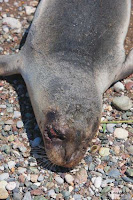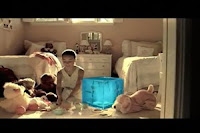
On April 27, a young monk seal of about four months was found in Northern Evoia, Greece, with a severe head injury.
The seal - a male - was still alive and he was rescued by MOm together with local vets. According to Vangelis Paravas of MOm, the seal was shot. One eye is lost and around it there is a large infected wound. The nasal cavity is damaged and the animal cannot dive. At the moment the seal is blind and unable to feed.
The poor seal is being provided first aid and medications and he was transferred to the wildlife clinic of the Veterinary School of Thessaloniki for rehab.
Senseless killing of critically endangered marine mammals is a crime towards both the animals and biodiversity. We humans do not own this planet: we share it with other creatures and we owe them respect.
Mediterranean monk seals survive in very low numbers, mostly in Greece. We should value their presence and welcome with great joy the animals' timid efforts to get back to healthy population numbers. What ignorant can ever think about shooting a young monk seal in the head, perhaps seeing this beautiful animal merely as a "competitor" for fish resources?
The day when there will be no competition by monk seals and dolphins - and therefore none of these animals around - will be a very sad day.
Giovanni Bearzi
---
Photo of the injured monk seal by Vangelis Paravas / MOm








